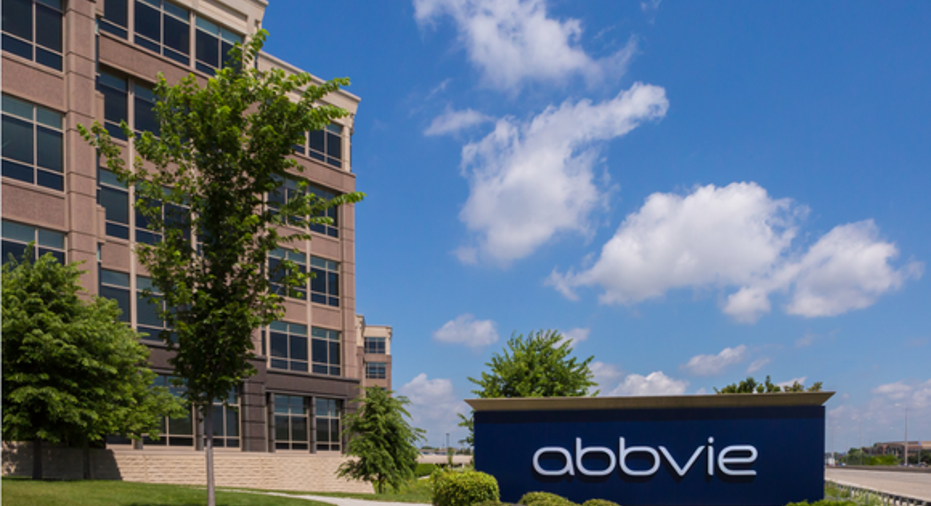AbbVie's Viekira Pak Sales Plummet in Q3

AbbVie Inc.'s (NYSE: ABBV) Viekira Pak made a big splash when it launched early in 2015. Aggressive pricing led to an exclusivity deal with America's biggest pharmacy benefit manager, Express Scripts, clearing the way for Viekira Pak to carve away at Gilead Sciences' (NASDAQ: GILD) dominance in treating hepatitis C. While Viekira Pak notched $1.6 billion in sales last year, its U.S. sales began sliding earlier this year, and in the third quarter, they continued to fall off a cliff.
Image source: AbbVie Inc.
A big, but fast-changing, market
Incivek, a prior-generation drug for hepatitis C virus (HCV) that launched in 2011, became the fastest drug to achieve billion-dollar blockbuster status, and its surging sales emboldened Gilead Sciences to spend $11 billion to acquire Pharmasset in 2012 so that it could get its hands on Sovaldi, an oral HCV drug that wasn't even in phase 3 trials yet.
After the drug delivered 90%-plus cure rates in trials, the FDA approved Sovaldi in late 2013. Sovaldi's advantages, including oral dosing and the removal of co-administration of side-effect-laden peginterferon for many patients, allowed it to dethrone Incivek as the fastest drug to achieve billion-dollar blockbuster status. Gilead Sciences followed up Sovaldi in October 2014 with the launch of Harvoni, a combination of Sovaldi and ledipasvir, an NS5Ainhibitor. Harvoni boosted functional cure rates to around 95% in patients with genotype 1 HCV, the most common form of the virus in the United States. At the same time, its advantages over Sovaldi, including better efficacy, the removal of ribavirin (another side-effect-causing medication) from the treatment regimen, and eight-week dosing for 40% of patients, resulted in Harvoni quickly overtaking Sovaldi in sales. In 2015, Harvoni and Sovaldi revenue totaled $13.9 billion and $5.3 billion, respectively.
Gilead Sciences' eye-popping hepatitis C drug sales in 2015 were especially impressive because they came in spite of AbbVie's rolling out its own genotype 1 treatment, Viekira Pak, in January 2015.An exclusivity deal with Express Scripts gave Viekira Pak market share out of the gate; however, dosing disadvantages and the February entry of Merck & Co.'s Zepatier, another genotype 1 drug, are quickly eroding that market share.
Unlike the once-daily Harvoni, Viekira Pak is a multiple-pill-per-day therapy that can require co-administration of ribavirin. Viekira Pak's shortest treatment course is 12 weeks, and while that 12-week course is cheaper (at list prices) than 12 weeks of Harvoni, eight weeks of Harvoni is an even bigger bargain.
In AbbVie's Q2 earnings conference call, CEO Rick Gonzalez blamed a slowdown in Viekira Pak's U.S. revenue on public plans embracing eight-week regimens:
As a result, Viekira Pak's U.S. sales tumbled 61% year over year to $87 million in the second quarter, and 69% to $76 million year over year in the third quarter.Globally, a weakening in U.S. demand resulted in Viekira Pak sales of $419 million in Q2 and $378 million in Q3.
Next-generation drugs on deck
Although Viekira Pak's use is waning in the U.S., AbbVie hopes to remain competitive in hepatitis C by launching a next-generation therapy next year.
AbbVie plans to present phase 3 results from its study of ABT-493 and ABT-530, a combination therapy, at a key conference in November, and assuming there aren't any hiccups, the company targets an FDA application and approval in 2017. If approved, ABT-493/ABT-530 could compete more aggressively with Harvoni given that AbbVie's phase 3 studies include an eight-week regimen.
Success of ABT-493/ABT-530, however, isn't guaranteed, because Gilead Sciences is knee-deep in developing its own HCV successors.
Gilead Sciences' Epclusa (Sovaldi plus velpatasvir), a pan-genotype HCV drug that's being marketed for genotypes 2 and 3, won the FDA green light this summer, and importantly,on Oct. 20, Gilead Sciences rolled out phase 3 results from four studies, including Polaris 2 and Polaris 3, that evaluated an eight-week regimen of Epclusa, plus voxilaprevir, an NS3/4A protease inhibitor, across all genotypes, for patients with or without compensated cirrhosis. The functional cure rate in Polaris 2 was a solid 95%, and in Polaris 3, which was limited to genotype 3 patients with compensated cirrhosis, it was 96%.Since an FDA application for approval based on these results is expected later this year, there's reason to think AbbVie will remain a much-smaller player in the indication than Gilead Sciences.
A secret billion-dollar stock opportunity The world's biggest tech company forgot to show you something, but a few Wall Street analysts and the Fool didn't miss a beat: There's a small company that's powering their brand-new gadgets and the coming revolution in technology. And we think its stock price has nearly unlimited room to run for early in-the-know investors! To be one of them, just click here.
Todd Campbell owns shares of Gilead Sciences.Todd owns E.B. Capital Markets, LLC. E.B. Capital's clients may have positions in the companies mentioned.Like this article? Follow him onTwitter where he goes by the handle@ebcapitalto see more articles like this.
The Motley Fool owns shares of and recommends Gilead Sciences. Try any of our Foolish newsletter services free for 30 days. We Fools may not all hold the same opinions, but we all believe that considering a diverse range of insights makes us better investors. The Motley Fool has a disclosure policy.



















